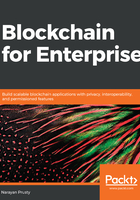
Transaction validity
As all transactions are not broadcasted to all parties in the network, to prevent a double spend (a double spend is an attack on DLTs to spend the same money twice, transfer the same asset twice and so on), we use notaries. Notaries contain all the unconsumed UTXOs, and after notarization they mark them as consumed and add the new unconsumed ones to their state. The transaction purposer gets the transaction notarized by a notary before sending to the other parties for commit.
A notary will only be able to sign a transaction if it has earlier signed input states of the transaction. But, this may not always be the case, therefore Corda also lets us change the state's appointed notary. This situation can occur mostly due to the following reasons:
- A transaction consuming states that have different appointed notaries
- A node wishes to use a different notary for achieving privacy or efficiency
Before these transactions can be created, the states must first be repointed to all have the same notary. This is achieved using a special notary-change transaction.
CorDapps are not like smart contracts of other platforms. They don't have a state. Their purpose is to just validate if the outputs produced from the inputs are correct. Every UTXO points to a CorDapp. CorDapps define the format of UTXOs. In a transaction, we can have UTXOs of multiple CorDapps, and in these cases each CorDapp will run only once and validate all the inputs and outputs belonging to it. For a transaction to be valid, it must be contractually valid; the CorDapp should approve it.
Apart from inputs and outputs, transactions might consist of commands too, small data packets that the platform doesn't decipher itself but which help CorDapps to process the inputs and outputs. A command is a piece of data associated with some public keys. Commands are used to provide additional information to the CorDapps that it cannot get via the UTXOs. The platform assures that the transaction is signed by every key listed in the commands before the contracts start to execute. Thus, the CorDapp can trust that all listed keys have signed the transaction, but is responsible for verifying that the intended parties have signed it. Public keys may be random or identityless for privacy, or linked to a well-known legal identity.
Oracles provide signed information to the transaction purposer in the form of commands that encapsulate a specific fact, and list the oracle as a required signer.
Also, transactions can contain a hash of attachments. Attachments are ZIP/JAR files. Attachments are useful when there's a large fragment of data that can be reused across several different transactions.
It is possible that while verifying a proposed transaction, the node may not have all the transactions of the transaction chain that it needs to verify. Therefore, Corda lets the node request the missing transactions from the proposer(s). It's always true that the transaction proposer will have all the transactions of the required transaction chain, as they would have requested it when verifying the transaction and created the purposed transaction's input states.
Finally, once the transaction is committed, you can query the Vault (which keeps track of both unconsumed and consumed states).